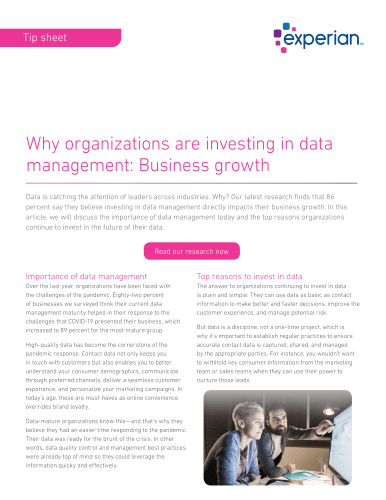- Products

Enjoy a free 30-day trial of our
data validation software.Experience the power of trusted data
solutions today, no credit card required! - Solutions

Enjoy a free 30-day trial of our
data validation software.Experience the power of trusted data
solutions today, no credit card required! - Partners

Enjoy a free 30-day trial of our
data validation software.Experience the power of trusted data
solutions today, no credit card required! - Learn more
- Pricing
- Contact Us
Why organizations are investing in data management: Business growth
Data is catching the attention of leaders across industries. Why? Our latest research finds that 86 percent say they believe investing in data management directly impacts their business growth. In this article, we will discuss the importance of data management today and the top reasons organizations continue to invest in the future of their data.
Importance of data management
Over the last year, organizations have been faced with the challenges of the pandemic. Eighty-two percent of businesses we surveyed think their current data management maturity helped in their response to the challenges that COVID-19 presented their business, which increased to 89 percent for the most mature group.
High-quality data has become the cornerstone of the pandemic response. Contact data not only keeps you in touch with customers but also enables you to better understand your consumer demographics, communicate through preferred channels, deliver a seamless customer experience, and personalize your marketing campaigns. In today’s age, these are must-haves as online convenience overrides brand loyalty.
Data-mature organizations know this—and that’s why they believe they had an easier time responding to the pandemic. Their data was ready for the brunt of the crisis. In other words, data quality control and management best practices were already top of mind so they could leverage the information quicky and effectively.
Top reasons to invest in data
The answer to organizations continuing to invest in data is plain and simple: They can use data as basic as contact information to make better and faster decisions, improve the customer experience, and manage potential risk.
But data is a discipline, not a one-time project, which is why it’s important to establish regular practices to ensure accurate contact data is captured, shared, and managed by the appropriate parties. For instance, you wouldn’t want to withhold key consumer information from the marketing team or sales teams when they can use their power to nurture those leads.
So, organizations continue to invest in the power of their data because they are seeing extraordinary benefits. For starters, they see positive impact in areas like:
- Better and faster decision-making
- Improved customer experience
- Operational efficiency
And when organizations invest even more in data management, they start to see benefits like:
- Cost savings
- Innovation
- And revenue
Data maturity is foundational to business growth. That’s why organizations are investing in data management today, tomorrow, and beyond.
Where to invest in data management
Data quality. Data has no power if it is inaccurate, irrelevant, and untrustworthy. Eighty-seven percent of business leaders say it is important they improve their data quality to become more data driven as a business in 2021 and beyond. The majority of the leaders we surveyed have invested in data management over the last year and believe that investing in data quality software will result in a higher return on investment.
Our research finds that 94 percent of business leaders say the quality of contact data has become more important over the last 12 months. What types of contact information are organizations prioritizing today?
- Email data
- Identity data, which is name and date of birth
- Phone data
- Address data
Each of these are essential to knowing who the customer is and how to reach them, which is vital in a pandemic. For instance, the majority of employees are working from home versus in the office, meaning they aren’t reachable through their office phone or address. For others, they may not be working for the same company or may have taken advantage of the remote work lifestyle by moving cross country. The point is that the contact information you may have had one month may not be applicable the next month. Data quality software is the starting point, but organizations are also focused on:
- Investing in integrated data management technology
- Implementing data management best practices
- Improving the data experience for internal users
Investing in data goes beyond technology. Once you have the right data and software that best fits your organization, it’s important to consider how the data is being distributed across the business and ensure that there is consistency in how the quality is controlled and managed.
Our latest research found that data maturity equals business growth, and the most mature businesses are seeing positive impact to revenue and cost savings. Data can help you keep up with market changes and stay ahead of the competition.
